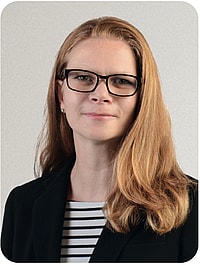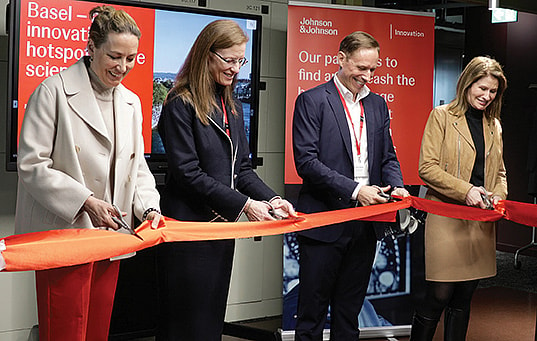- Get directions
- Leave a review
- Claim listing
- Bookmark
- Share
- Report
- prev
- next
- Monday, May 5, 2025 @ 11:00 am
Switzerland Global Enterprise’s Sirpa Tsimal talks to Leila Schwery and Michael Hübner of Johnson & Johnson about the company’s commitment to fostering global partnerships, the evolution of its manufacturing and supply chain strategies, and the critical role Switzerland plays in shaping its global capabilities.

Sirpa Tsimal
Switzerland Global Enterprise | Director Investment Promotion

Leila Schwery
Vice President, Manufacturing & Technical Operations
Leila Schwery leads the manufacturing functions for Johnson & Johnson Innovative Medicine which includes the internal and external manufacturing network and the technical operations (Manufacturing Science, Engineering and Data Management).
Could you briefly outline your core focus areas and how they shape the company’s global operations?
Leila Schwery: Johnson & Johnson has been present in Switzerland since 1959, when the company acquired Cilag AG in Schaffhausen. Today we are one of the largest US employers in the country, with operations at nine sites in seven cantons.
Globally, Johnson & Johnson Innovative Medicine plans to advance more than 70 novel therapy and product expansion filings or launches by the end of the decade. These innovations are in important areas such as oncology, immunology and neuroscience.
We are entering a new era of growth; as our portfolio is evolving, our pipeline is accelerating to deliver life-changing medicines to patients, and we need an efficient and reliable supply chain to enable our future growth. Our manufacturing site in Schaffhausen plays a critical role delivering medicines to patients around the world.
What are the defining features of your global manufacturing and supply chain network, particularly in addressing challenges like sustainability, digitalization, and geopolitical disruptions?
Leila Schwery: We operate in a VUCA environment (Volatile, Uncertain, Complex, Ambiguous), which poses many challenges. At the same time, medical science is advancing at an unprecedented rate, leading to increasingly complex treatment modalities, processes and supply chains. In this context, we must constantly evolve to increase agility and reliability and accelerate innovation.
As the world’s largest, most diversified healthcare products company, we aim to advance innovation for the benefit of all patients. Our business strategy considers geopolitical risks to enhance our ability to respond to any number of changing factors. We deploy business continuity plans that maintain critical inventory, leverage partnerships to support preparedness, and maintain geographic diversity.
Johnson & Johnson’s climate goals include sourcing 100% renewable electricity by the end of 2025 and reducing emissions across our global operations, while also working with our suppliers on their own decarbonization efforts.
With the 2025 Swiss Biotech Report focusing on “The Power of International Alliances”, how do you envision the company’s role in fostering cross-border collaborations to drive the future of life sciences?
Leila Schwery: The life sciences sector in Switzerland and the EU is in global competition with other regions that are investing heavily in healthcare innovation, and Europe is increasingly falling behind the US and Asia-Pacific in terms of total investment. In view of this development, we believe that the life sciences sector must be at the center of all future initiatives to increase industrial competitiveness in Europe, across all national borders.
A strong life sciences ecosystem is crucial for Switzerland and Europe to meet the needs of patients, doctors and nursing staff. We need to boost our economies to create jobs and new opportunities. This requires strategic investments in research and innovation, but also the promotion of advanced manufacturing, the active use of data and artificial intelligence, the promotion of public-private partnerships, and strengthening of the sustainability and resilience of healthcare systems.
Can you share an example of a successful alliance or collaboration in Switzerland that has had a significant impact on the company’s global capabilities?
Leila Schwery: There are indeed various examples as we see Switzerland, with its extraordinary competitiveness in academia and industry, as a key player in shaping the future of pharmaceutical manufacturing. It is probably best if I outline our approach in general, grouped into three buckets:
1. Collaborations with academia:
We collaborate with world-class institutions like ETH and HSG, e.g. as members of the ETHZ-HSG Manufacturing Alliance, which aims to research the most critical operational topics and long-term challenges facing its members. This will not only advance the manufacturing field but also deliver meaningful benefits to patients and society as a whole.
2. Collaborations with Swiss startups
With one of our external partners we are exploring how to make cutting-edge AI techniques part of our process monitoring and root cause investigation. Using algorithms to establish significant causal relationships between inputs and things like product quality attributes, our aim is to reach a situation where every single process is accurately modelled. As a member of the roundtable of the Swiss startup association we meet new startups and can provide input regarding the needs in our industry. The main benefit of these interactions is that they allow us to scout, import and test new technologies. In a world of hype, we as scientists try to pick only what really drives value.
3. Collaborations with Swiss Big Industry
We work with various Swiss CDMOs to address the growth of our portfolio. External partners are complementary to our own manufacturing sites. Batches produced by Swiss CDMOs supply our product worldwide.

Michael Hübner
Director, Early Innovation Partnering, Switzerland
Michael Hübner is the Country Lead in Switzerland for Early Innovation Partnering at Johnson & Johnson. He heads the Innovation Hub Switzerland in Basel, and he is a member of the Johnson & Johnson Switzerland Leadership Team.
Shifting focus to innovation, could you describe the key elements of your external innovation group and the place it has within the global organization?
Michael Hübner: Johnson & Johnson’s external innovation group is committed to transforming health outcomes for patients by finding and supporting the most promising early-stage innovations, wherever they originate. We are strategically embedded in key innovation hubs worldwide through Innovation Centers in London, Boston, San Francisco, and Shanghai, enabling us to connect entrepreneurs, scientists, and emerging companies with our global network of expertise, insights, and resources.
Our approach encompasses our external innovation collaboration and partnering group, our global incubator network (JLABS), and our corporate venture capital organization (JJDC), making us a partner of choice across biotech and academia for those seeking to bring their innovations to patients, according to early-stage healthcare innovators at Inpart’s 2023 and 2024 Biotech Partnering surveys.
Innovation requires thinking differently and pushing the boundaries of traditional healthcare. Whether it is enabling earlier detection and treatment of diseases or advancing novel therapies and surgical procedures, we are passionate about leveraging science and technology to create transformative solutions and patient outcomes. With over 137 years of experience in improving human health, we remain all-in for the journey with our partners to redefine the future of healthcare for patients around the globe.
What strategies does Johnson & Johnson’s external innovation group employ to build and maintain strong global partnerships and what specific advantages can Switzerland offer?
Michael Hübner: Our strategy for building and maintaining successful global partnerships and collaborations is rooted in four essential elements. First, we prioritize the transformative potential of the idea or asset and its ability to address significant unmet medical needs. Second, we evaluate the quality and experience of the science and leadership team, as we believe strong expertise is critical for success. Third, we ensure that deal terms are fair and mutually beneficial, creating a foundation of trust and shared goals. Lastly, opportunities are aligned with our corporate strategic priorities and internal capabilities. Importantly, we also value the representation of scientific teams and advisory boards and recognize the considerable value this brings to collaborations, partnerships and transformational innovation.
By integrating these strategies, we aim to not only build strong, lasting collaborations and partnerships but to create an environment where new ventures can flourish, transforming healthcare and improving outcomes for patients.
Switzerland is often viewed as a key hub for life sciences and biotech. How does its ecosystem contribute to your innovation efforts globally?
Michael Hübner: Switzerland is a global leader in sourcing innovation, and in 2024, we became the largest pharma investor in the country.¹ This was driven by key transactions, including the USD1.25 billion acquisition of Yellow Jersey Therapeutics – a demerged subsidiary of Numab Therapeutics – and investments by our corporate venture capital organization, JJDC, in other Swiss-based companies. Additionally, several promising startups joined JLABS EMEA, where we collaborate closely with entrepreneurs, providing expertise and resources to help accelerate their innovations.
To further strengthen our engagement with Switzerland’s vibrant innovation ecosystem, we opened Johnson & Johnson’s external innovation hub in Switzerland in April 2024. Located within our Basel Campus offices, the hub serves as a critical platform for fostering connections with external collaborators and partners and promoting innovation across Switzerland and neighboring countries. This initiative underscores our commitment to nurturing local innovation while advancing global health solutions.
¹ Source: Dealforma, Public records. Data based on direct investment into a Swiss entity.
Can you share an example of a successful global alliance led by Johnson & Johnson’s external innovation group and the impact it had on healthcare innovation?
Michael Hübner: Many of our over 5’600 employees and contractors across our nine Swiss sites joined through collaborations, partnerships and acquisitions with local companies, reflecting our strong commitment to fostering innovation in Switzerland. One notable example is our acquisition of Actelion in 2017, which brought transformative medicines for pulmonary hypertension to patients worldwide. This successful alliance has had a profound impact on healthcare by addressing a critical unmet medical need and expanding patient access.
Our long-standing partnership with Cilag in Schaffhausen, dating back to 1959, and our MedTech business with DePuy Synthes, acquired in 2012, further highlight our history of successful collaborations in Switzerland. Most recently, and as previously mentioned, we entered into a transaction with Yellow Jersey Therapeutics, acquiring this company with a promising asset for atopic dermatitis. This innovative therapy is now being developed in late-stage clinical trials, reinforcing our commitment to advancing treatments that improve patients’ lives.
What challenges do you see in attracting and retaining the right talent pool for healthcare startups, and how does Johnson & Johnson support and mentor entrepreneurs?
Switzerland’s talent pool is a key factor in its global reputation for scientific innovation. The country is home to leading pharmaceutical and medtech companies employing thousands of highly skilled professionals, as well as world-class universities and research centers. Together, these institutions fuel a vibrant startup ecosystem that competes on a global scale and contributes to the strength of its workforce.
Additionally, Switzerland’s appeal extends beyond its robust academic and industrial framework. Its spectacular landscape, safe environment, and stable labor conditions make it an attractive destination for recruiting top talent from around the world. However, one challenge lies in building critical business skills among Swiss entrepreneurs emerging from academia. Compared to their counterparts in places like the US, these entrepreneurs may lack commercial expertise, which can limit their ability to attract international investors.
To address this, we have formed long-term relationships with key organizations, such as the Basel-based healthcare accelerator BaseLaunch, with whom we have collaborated since its inception in 2017, and the medtech-focused SITEM Startup Club in Bern. Through these local collaborations, we provide mentorship to startup founders to equip them with the business skills needed to drive innovation in treatments, supply chain, manufacturing, and beyond.
